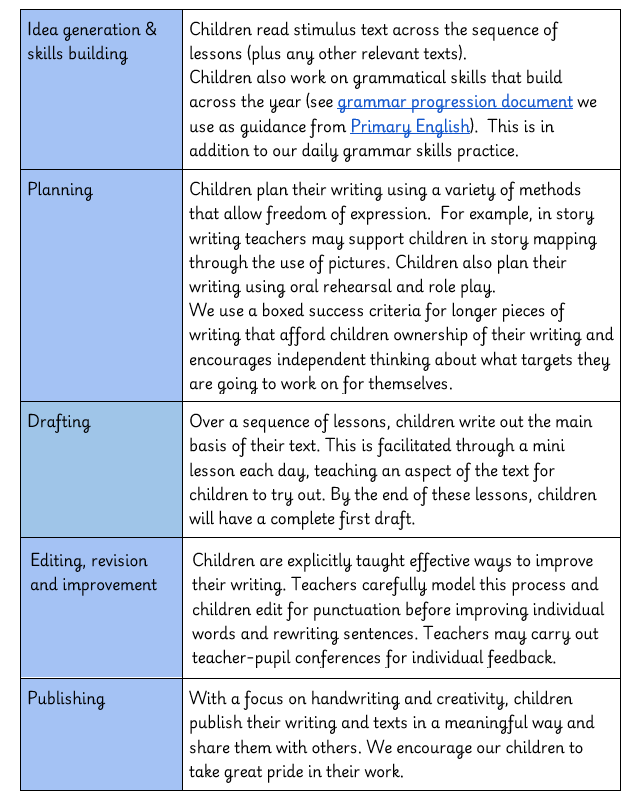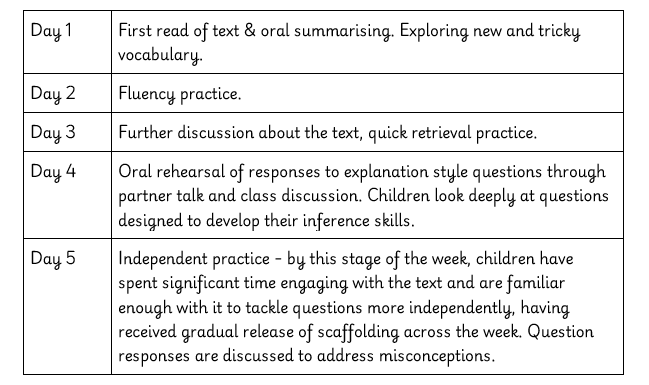
English Curriculum
Higher Bebington Junior School
English Curriculum
English sits at the heart of our curriculum – it is through language, story and text that children learn to form concepts, connect ideas and express themselves. Through literacy, in all its forms, children learn to both make sense of the world and shape their place within it.
Writing is taught through high-quality texts – ranging from picture books to Shakespeare. Over their time at our school, children will write a variety of fiction and non-fiction texts, including recounts, news reports, explanation texts, poems, plays and stories of all kinds. We use drama, role-play, storytelling and discussion to engage the imagination, before moving on to vocabulary exploration, sentence craft and creative writing. Children are taught to apply their writing skills across the curriculum and to see a purpose for their writing.
To support our writing, we also carry out daily practice of key foundational skills for transcription and composition - grammar, spelling and handwriting is allocated dedicated time at the beginning of every English lesson. This allows us to revisit core skills every day and children are encouraged to use what they have learnt and practised during these sessions in both English writing lessons and the rest of the curriculum.
The Writing Process
Our English writing lessons are structured across a sequence of lessons to work on the writing process as a whole:
Grammar and punctuation
Our Grammar and Punctuation Progression document from Primary English sets out the skills that are worked on in each year group. We ensure that we revisit skills taught in Key Stage 1 and in previous years regularly to ensure that children continue to fully embed them and their importance remains high priority. Each year group will also work on the skills for their year group in dedicated daily grammar sessions that revisit new skills throughout the year. Grammar is then further developed within our main writing sessions so that children can put these discrete skills into practice and context. Children are taught to understand why knowledge about grammar in the English language is vital to support the writing process. A daily emphasis on grammar and punctuation allows us to reinforce the importance of checking for correct grammar and punctuation in developing our children as critical thinkers about their own writing.
Spelling
We use the Read Write Inc spelling scheme in which children work on knowing the relationship between sounds and letters (phonics).
The RWI spelling programme is a structured programme designed for children in Y2 -6 and it meets the requirements of the National Curriculum. It is the natural progression from the RWI phonics that is being delivered from F2- Year 1 in Town Lane.
The programme follows a simple, repetitive structure. There are 12 units to complete in Year 3 and 4 and 14 in Years 5 and 6. In all year groups there are special focus units and practise tests to complete. In each unit there are 11 simple activities for the children to complete and they include opportunities to explore spelling patterns, complete dictionary and thesaurus challenges, complete dictation exercises and practice tests.
There are structured sessions plus further consolidation practice of sounds and words identified by class teachers as needing further focus.
We have adapted lessons and our spelling timetable as a whole to suit the needs of our learners and to ensure we are adhering to the spelling requirements of the National Curriculum in terms of looking at spelling beyond phonics. We carry out daily spelling lessons with explicit teaching and practice. Our spelling programme is based around a two week timetable that allows us to work on understanding morphology (word structure), orthography (spelling structure) and etymology (where words come from and how meaning can change over time) in addition to phonics. Children are tested periodically and teachers then revisit particular spelling patterns or words that need further consolidation with the class as a whole or individually.
Handwriting
Handwriting is an essential component of transcription. Children need to be able to write fluently, legibly and at speed where required. We encourage our children to take great pride in their handwriting and carry out daily handwriting practice.
Fine motor skills are an integral part of being able to control handwriting and as part of our daily practice children carry out fine motor finger exercises to build strength and coordination.
We use Teach Handwriting to to support teachers in modelling letter formation and letter joins, following Continuous Cursive Route D. Teachers also model how to put specific joins into context by modelling words and then sentences, depending on year group.
Children are reminded to Prepare for P Checks following guidance from the National Handwriting Association:
Our handwriting progression across year groups and further details on lesson structure and handwriting expectations can be found in our Handwriting Progression Document.
As children progress through Key Stage 2 children are encouraged to evaluate their own handwriting as part of our editing process where they are introduced gradually to S Factors, also from the National Handwriting Association.
Writing for pleasure
As well as developing our children into competent and fluent writers, we also aim to develop their enjoyment and motivation to write. Every Friday is ‘Free Write Friday’ in which children work on their own personal writing projects and write whatever they choose to write.
Here, children have 25-30 minutes where they write about whatever they want to write about. The teacher also sits and writes for this time. They can choose the content, purpose, form, audience and process and it is completely personal to them - in their own journals that we don't mark.
At the end of the session, time is given for any volunteers to share their writing if they choose. The intention is to develop the muscle to give it a go where they are free to experiment and express whatever they choose to.
English - Reading
First and foremost, we want all children at Higher Bebington Junior School to develop a life-long love of reading.
Word reading
In accordance with the National Curriculum, our initial focus is on word reading using phonics to understand that letters on the page represent sounds in spoken words. We use the Read Write Inc phonics scheme which is used from F1 to Year 1 at Town Lane to ensure a familiar progression in how lessons are delivered from Key Stage 1 to Key Stage 2. Further information about Phonics at Higher Bebington Junior School may be found on our Phonics page.
Once children are able to decode,children are assessed for their reading age and this is used to allocate children a colour for a levelled reading book from the Oxford Reading Tree scheme. Children should change their book weekly and bring home a book from the scheme each week. Once children have reached a Dark Red level, they are able to choose an unlevelled book of their own choice to take home and read each week.
Teachers continue to read 1:1 with children as much as they can and we are fortunate to have some volunteers visiting school who also listen to children read aloud to practice fluency. If you would like to volunteer your time, please contact the school office or you may register with https://www.schoolreaders.org/volunteer
We log reading via https://www.boomreader.co.uk/ and encourage you to log your child’s reading at home too. If you need a reminder of your child’s log in please contact their class teacher.
Reading comprehension
Reading comprehension skills are predominantly taught through high-quality texts during whole class Guided Reading sessions.
We carry out daily reading sessions that work on different skills, building upon each other across the week to enable children to engage deeply with the text, unpicking vocabulary and retrieving information. By carrying out daily reading sessions, children have the opportunity to build their confidence in tackling challenging texts through daily rereading of the same text.
Our weekly reading sessions are structured as follows:
Our Reading Skills Progression document may be accessed for further in depth information about year group expectation.
Being able to read fluently is an essential skill for children to access the whole curriculum at primary school and keep up with the demands of secondary school. We therefore begin every lesson in science and other foundation subjects with a section of text that unlocks subject specific knowledge, and enables children to practice reading fluency in every subject. Reading across the curriculum motivates children to read both fiction and factual texts in their own time and helps them understand that reading may be for a range of purposes. We use whole-class interactive strategies with choral work and partner discussion to help pupils understand and remember what they are learning.
Reading for pleasure
Children have time within the school day to read for pleasure. During this time, children are encouraged to make their own independent choices for what they would like to read. Reading for pleasure is simply that - children are able to read whatever they want during this time.
Teachers read a huge variety of written material regularly with the children, fiction and non-fiction, stories, reports, diaries and poems. Each year group has access to a ‘Class Book Library’ containing challenging and interesting novels and a range of other text types for children to choose books from during their reading for pleasure time. We encourage our children to treat these areas as highly interactive and leave recommendations for each other.
Each class has a class book they enjoy with their teacher which is also read to them purely for pleasure and enjoyment. We see this as a special time to engage with a text outside of main reading lessons where there is no pressure to carry out written responses or further work. Teachers may select books based on their knowledge of class interests, latest book releases and the curriculum. Sometimes, children are offered a range of books to choose from and they democratically vote for which book they would like to read as a class.
At the beginning of every school year, children also have the opportunity to vote for their class name for that year. Their class name is chosen from a range of three different authors for each class. This allows teachers to introduce children to authors they may not have yet discovered for themselves. Then classes proudly display their choice outside each class and books from their cohen author are made available in each class. Current class names are as follows:
We have a read aloud poetry spine that teachers also share poetry for pleasure from.
We also have weekly Book Club sessions in class during which children talk about the books they are reading, new books, authors and make recommendations to each other.
Teachers may use a range of sites to select books from. We recommend The Reader Teacher as a valuable source of the latest high quality texts for both teachers and parents to use.








